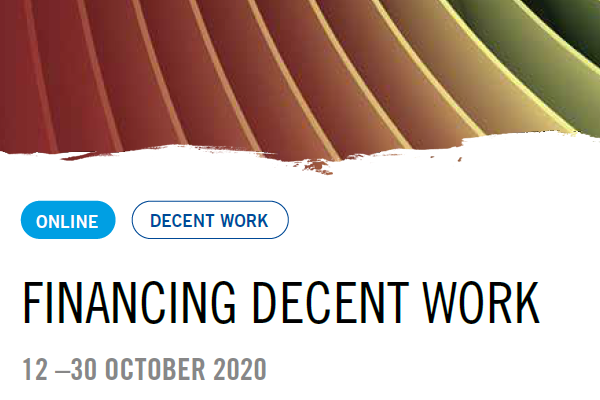
The International Training Centre of the ILO (ITC-ILO), with the support of the ILO’s department Partnering for Development (ILO/PARDEV), is launching an online course on Financing Decent Work. This training course targets ILO tripartite constituents, staff and other stakeholders in the Decent Work and development finance spaces, and will be delivered over a period of 3 weeks, from 12 to 30 October.
With the objective of scaling up resources to achieve the SDGs, the Addis Ababa Action Agenda of 2015 set out a new global framework for financing sustainable development that aligns all financing flows and policies with economic, social and environmental priorities. The BAPA+40 Outcome Document also highlights the importance of innovative sources and mechanisms of additional financing, encouraging countries to further explore new sources and instruments of innovative financing for funding the Sustainable Development Goals. UN agencies are thus making efforts to increase financing for development, including both domestic and international resources for development and both public and private sources. Increasingly new mechanisms such as impact investments, crowd- funding and social impact bonds are developed, with the related impact and associated risks on the development outcomes in the Global South.
In this context, the Financing Decent Work course will share knowledge on SDG financing strategies and how Decent Work priorities can be incorporated and mainstreamed; national SDG financing mechanisms that seek to combine domestic and international, public and private sources of financing, including by the Global South; Decent Work financing strategies and mechanisms that can be applied at country level; how to participate in or initiate national consultations on channeling SDG finance towards Decent Work outcomes.
The course is based on a South-South methodology, with peer-learning, sharing knowledge and experiences, and building solutions together being adopted as instruments for building capacity of government agencies, workers’ and employers’ organizations, as well as a wider group of development partners and practitioners collaborating on achieving Decent Work. A cross-cutting module on South-South and Triangular Cooperation will demonstrate how to best make use of SSTC instruments for peer-learning and knowledge-sharing on Financing Decent Work. South-South scholarships will be provided for participants, who will be requested to provide inputs on successful policies and practices in their respective countries (short article, video or presentation), thereby supporting knowledge sharing and the creation of a network of practitioners. Good practices will be uploaded on the South-South Meeting Point. Participants will also take part in five webinars with leading experts, including a South-South webinar for exchanging experiences with the participation of Ben Quiñones and Leandro Morais. A thematic space dedicated to SSTC for Financing Decent Work in the South-South Meeting Point can be accessed here.

